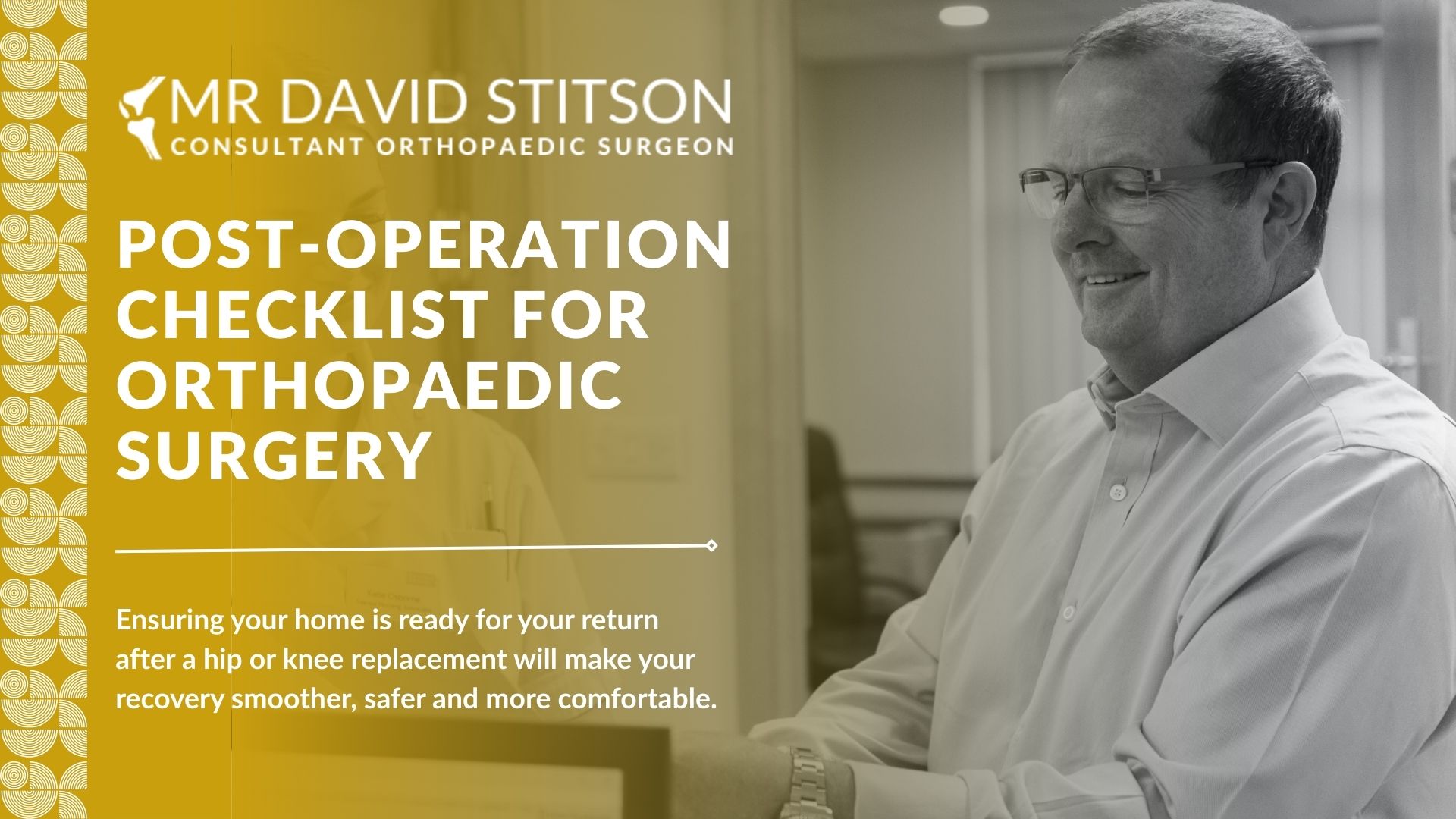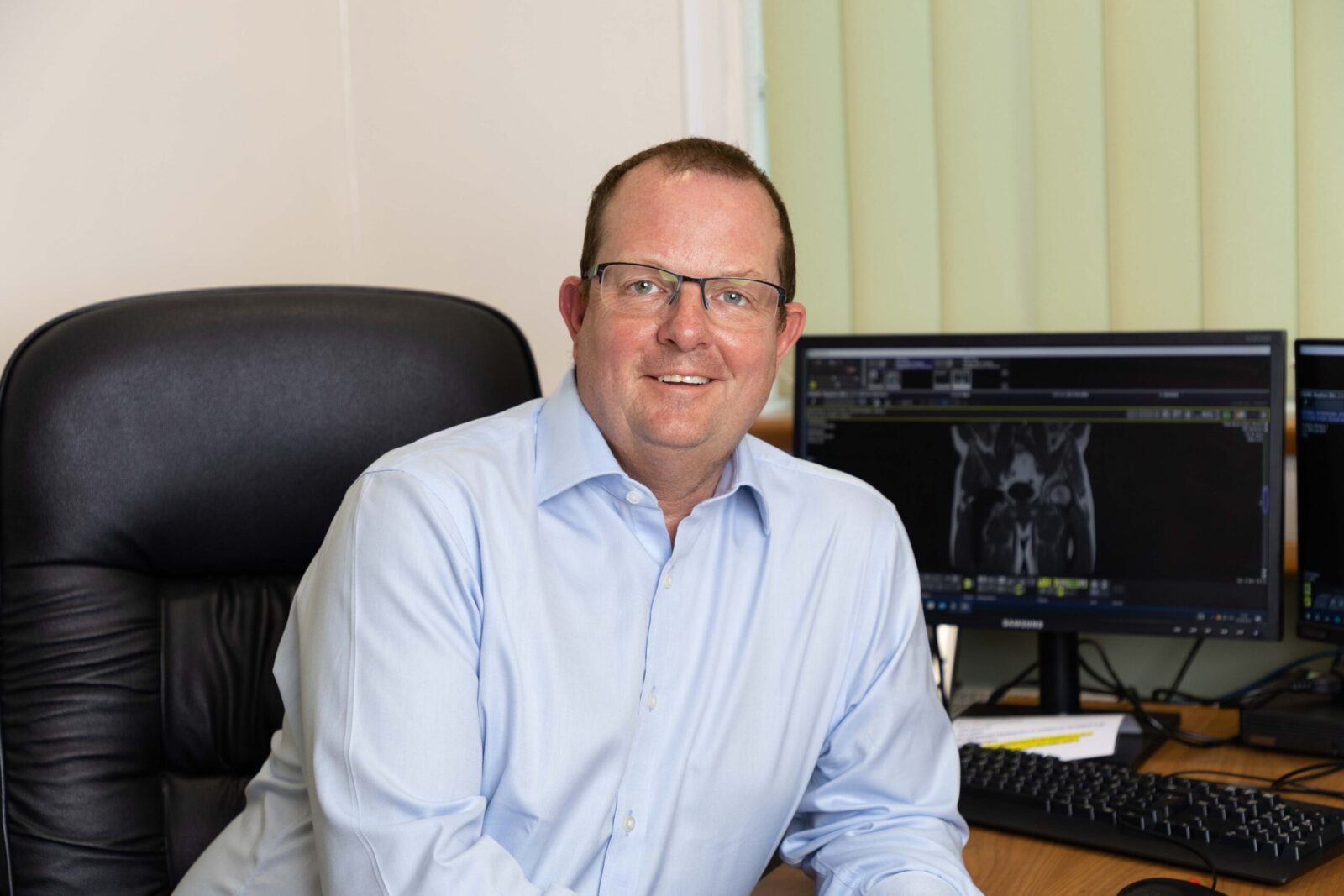Ensuring your home is ready for your return after a hip or knee replacement can make your recovery smoother, safer and more comfortable.
Essential Medical Supplies
Acquiring key medical supplies in advance will prove invaluable during your recovery period. Items such as crutches, walking frame or a wheelchair might be necessary depending on your surgery. (With the exception of a wheelchair, these items will usually be issued by your healthcare provider). Basic dressings may be helpful to have at home, however, please seek advice from Mr Stitson before self-changing dressings once at home.
Contents
ToggleAdapting Living Spaces
Adapting your living area is crucial to facilitate mobility and reduce accident risks. Consider:
- Removing potential tripping hazards like rugs and loose carpets
- Arranging furniture to allow clear pathways
- Installing grab bars in bathrooms for security
Setting up a comfortable recovery space, ideally near a bathroom, can provide ease and safety.
Arranging Support Systems
Recovering from orthopaedic surgery can be challenging without assistance. Arrange for help from family, friends or professional caregivers during the initial weeks. Simple tasks like cooking, shopping or even walking pets might require support.
Establish a communication plan, ensuring someone is available for emergencies or regular check-ins.
Orthopaedic Post-operative Checklist (free download)
A thoughtful post-surgery plan is crucial for a successful recovery. Download our Orthopaedic Post-operative Checklist which covers essential items and tasks to aid your healing process, from monitoring pain levels to recognising symptoms that may require medical attention.
Proper preparation greatly impacts your recovery experience, and with Mr Stitson’s expert guidance, you can feel confident about facing your orthopaedic surgery.

Mr Stitson's Post-Op Checklist for Orthopaedic Surgery
Download the full checklist here »
Knee Replacement
Most of your pain and swelling from your knee replacement surgery should be gone within three months of surgery. However, you may still have some discomfort with activities such as going up and down stairs or sitting in one position for too long for a little longer. It is important to remain physically active, maintain a healthy weight and follow physiotherapy advice to achieve the best recovery.
- It is important to keep moving to avoid stiffness. Focus on regaining knee flexion as well as maintain full extension in the knee. Take analgesia as needed to allow for this.
- Walk with your crutches regularly and gradually increase the distance walked. When not exercising sit with your feet up to help minimise swelling.
- Initially walk with two crutches. As the need for these decreases, consider using a single walking stick in the opposite hand to the side of surgery.
The need for walking aids usually ends by six weeks but can vary either way depending on individual circumstances.
Hip Replacement
Full recovery from a hip replacement varies from person to person, but most people are doing well by three months of the operation. It is often possible to return to light activities and office-based work within around 6-8 weeks. It may take a few more weeks if your job involves heavy lifting.
- It is important to mobilise with your crutches regularly and to concentrate on trying to walk normally between the crutches.
- Initially walk with two crutches. As the need for these decreases consider using a single walking stick in the opposite hand to the side of surgery.
- The need for walking aids usually ends by six weeks but can vary either way depending on individual circumstances.
Follow-up
If unexpected problems, emergencies or other issues occur call Mr Stitson.
This information is not intended to replace specific instructions from Mr Stitson. Check with your doctor to make sure these instructions apply to your case.
It is essential to discuss all your options with Mr Stitson, who can guide you through the treatment process and advise on how you can achieve the best possible outcome.
Post-Op Preparation FAQs
Q: What should I do to prepare my home for post-orthopaedic surgery recovery?
A: Ensure your home is organised for easy access to essential items. Remove trip hazards, clear pathways, and consider re-arranging furniture to widen walking areas. Place frequently used items within easy reach and ensure your phone is always accessible.
Q: Do I need to install any specific equipment in my home for recovery?
A: Yes, it is advisable to install grab bars in bathrooms, use a shower chair, and consider elevated toilet seats. You might also need a walker or crutches, and ensure you have a comfortable chair with good back support and armrests for getting up easily.
Q: How can I make my living space more accessible?
A: Consider living on one level during your recovery to avoid stairs. Set up a recovery area with all necessities like medications, water, and reading materials. Install temporary ramps if stair access is unavoidable.
Q: What changes should I make in the bathroom to aid recovery?
A: Install non-slip mats in the shower and near the toilet. Secure grab bars for stability and consider a handheld showerhead for easier bathing. A shower chair or bench can also be very helpful.
Q: How can I manage pain effectively at home post-surgery?
A: Follow Mr Stitson’s prescribed medication schedule diligently. Use ice packs as recommended to reduce swelling and follow any advised exercises to aid recovery. Keep Mr Stitson informed of any changes in your pain.

About Mr Stitson
David Stitson is a Plymouth-based Consultant Trauma and Orthopaedic Surgeon. Trained both in the UK and internationally, he has worked in medicine for more than 20 years for the NHS, for the Royal Air Force and in private practice. Mr Stitson operates privately at the Nuffield Health Hospital, Plymouth.

The Nuffield Plymouth CQC Rating
The Nuffield Hospital has a history that spans over half a century and has built a reputation for high standards of care, professionalism and expertise in delivering health services. They aim for continuous quality improvement in everything they do.
Active Quality and Governance programmes are in place at the Nuffield Hospital Plymouth. As part of this, the hospital is inspected by independent healthcare regulators to ensure it meets the fundamental standards of quality and safety as determined by the regulating body (CQC).
In the most recent inspection, Plymouth Nuffield Hospital was rated as ‘Good’ overall, however, the surgical element of the inspection was rated as ‘Outstanding’. The hospital was referred to as:
“Outstanding in effective and caring, and
Good in safe, responsive and well-led.”




